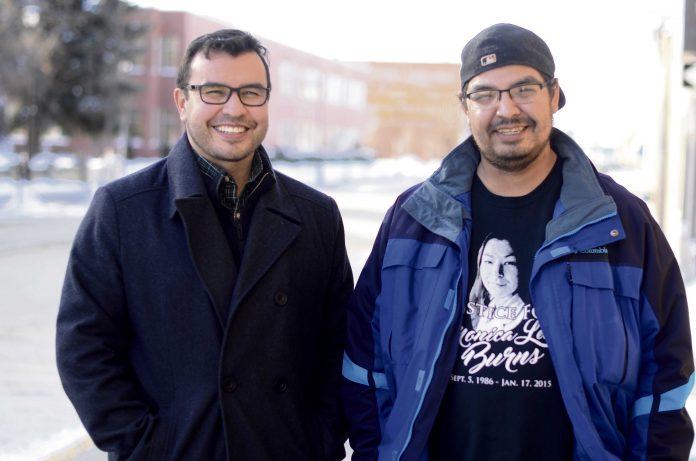
A pair of Prince Albert-area men are planning a walk this weekend to remember Missing and Murdered Indigenous Women and Girls (MMIWG), and to urge the inquiry to hold a session in the province’s north.
Conrad Burns and Pernell Ballantyne will start their walk at the monument to MMIWG in Saskatoon on Friday and will walk up to Prince Albert, ending on the north end of Diefenbaker Bridge on Sunday afternoon. By crossing the bridge, they will symbolize heading north, something the inquiry didn’t do.
The issue is important for both men, but for Ballantyne, it hits particularly hard.
He did a similar walk three years ago in honour of his sister Monica Lee Burns, who was killed by Todd McKeaveney.
McKeaveney was originally charged with second-degree murder, but accepted a plea deal that saw the charge reduced to manslaughter. He was sentenced to 13 years in prison, with credit for time served.
Ballantyne did get a chance to speak at the MMIWG inquiry when it was in Saskatoon.
“It was hard, emotional and tough,” he said.
“It was even tougher to hear the other people’s stories. The way they feel is the same way I feel in my heart. Justice fails them.”
Conrad Burns said by telling their stories, families can make sure they have an impact.
“Working with the (families of) missing persons of Prince Albert, I realized there is a lot of holes, things not met by the community,” he said.
“We have to hear those stories, find out where those loopholes are and fill the gaps. By working proactively, completing these programs, working with families and meeting their needs, we hope to minimize this in the future.”
While Ballantyne did have the opportunity to speak in Saskatoon, so many families from northern Saskatchewan did not. Some didn’t have enough time to register, while others couldn’t make their way down to Saskatoon.
“There are a lot of stories out there that are not being heard,” Burns said.
So, the men, and other supporters, will walk.
“We’re trying to raise awareness for northern families, and for missing and murdered Indigenous women and girls,” Ballantyne said.
“Three years ago I walked the same road. Instead of an anniversary, this is going to be more, attaching that awareness about the north.”
So far, support has been strong. The parents of Happy Charles, the La Ronge woman who went missing in Prince Albert, will join the pair in Saskatoon. Burns and Ballantyne have also reached out to the FSIN, the PAGC, the women’s commission, their respective First Nations and friends and family.
“It’s amazing how people are rallying behind the cause,” Burns said.
Violence against women, in general is a problem. According to several studies, anywhere from one in five to one in three women will be a victim of violence in their lifetimes.
It gets worse for Indigenous women, who go missing four times more often than non-Indigenous women.
“That’s unfathomable to me,” Burns said.
“It happens too much. Our women are being victimized. Being murdered or going missing is the ultimate abuse. We have to rally as a community to deal with it.”
Burns said walking with a message is a good way to rally support. By completing this walk, he said, Ballantyne will serve as a role model for other Indigenous men to return to remember their cultural roots.
“Traditionally, in an Aboriginal community, we’re a matriarchal society, so we respect women above and beyond ourselves. Unfortunately, we’ve lost that traditional view,” Burns said.
“(Ballantyne) becomes a role model to follow, and encourages society to ask why we’re doing this and to question our way.”
Ballantyne spoke about the traditional focus on women in Indigenous culture.
“We always have to give that respect to women. They’re more sacred than anything else,” he said.
“Our culture, our ceremonies, everything else comes from our women. That’s why they’re so cherished.”
Like Ballantyne, Burns stressed the importance of the Indigenous cultural background.
“We have to reclaim our traditional ways, because culture leads to self identity, and self identity leads to self confidence. You don’t know where you’re going unless you know where you come from. You have self confidence to move beyond situations such as abuse, drug abuse, alcohol abuse, neglect and hurt because there are protocols in place in culture that hep you deal with … situations.”

